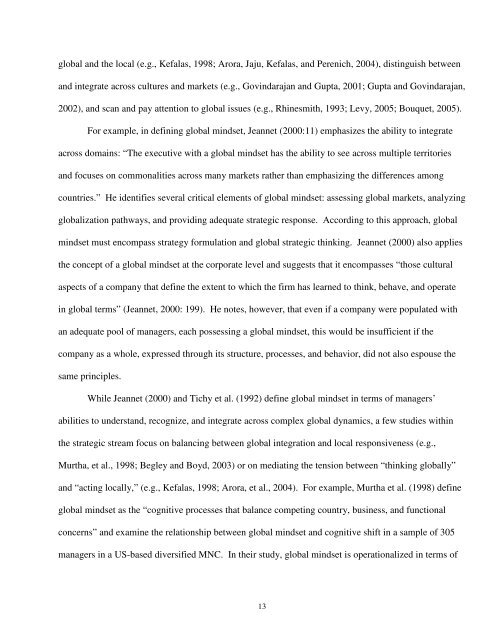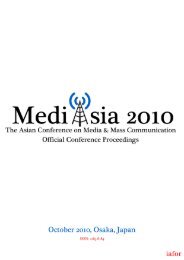What We Talk About When We Talk About “Global Mindset”
What We Talk About When We Talk About “Global Mindset”
What We Talk About When We Talk About “Global Mindset”
You also want an ePaper? Increase the reach of your titles
YUMPU automatically turns print PDFs into web optimized ePapers that Google loves.
global and the local (e.g., Kefalas, 1998; Arora, Jaju, Kefalas, and Perenich, 2004), distinguish between<br />
and integrate across cultures and markets (e.g., Govindarajan and Gupta, 2001; Gupta and Govindarajan,<br />
2002), and scan and pay attention to global issues (e.g., Rhinesmith, 1993; Levy, 2005; Bouquet, 2005).<br />
For example, in defining global mindset, Jeannet (2000:11) emphasizes the ability to integrate<br />
across domains: “The executive with a global mindset has the ability to see across multiple territories<br />
and focuses on commonalities across many markets rather than emphasizing the differences among<br />
countries.” He identifies several critical elements of global mindset: assessing global markets, analyzing<br />
globalization pathways, and providing adequate strategic response. According to this approach, global<br />
mindset must encompass strategy formulation and global strategic thinking. Jeannet (2000) also applies<br />
the concept of a global mindset at the corporate level and suggests that it encompasses “those cultural<br />
aspects of a company that define the extent to which the firm has learned to think, behave, and operate<br />
in global terms” (Jeannet, 2000: 199). He notes, however, that even if a company were populated with<br />
an adequate pool of managers, each possessing a global mindset, this would be insufficient if the<br />
company as a whole, expressed through its structure, processes, and behavior, did not also espouse the<br />
same principles.<br />
While Jeannet (2000) and Tichy et al. (1992) define global mindset in terms of managers’<br />
abilities to understand, recognize, and integrate across complex global dynamics, a few studies within<br />
the strategic stream focus on balancing between global integration and local responsiveness (e.g.,<br />
Murtha, et al., 1998; Begley and Boyd, 2003) or on mediating the tension between “thinking globally”<br />
and “acting locally,” (e.g., Kefalas, 1998; Arora, et al., 2004). For example, Murtha et al. (1998) define<br />
global mindset as the “cognitive processes that balance competing country, business, and functional<br />
concerns” and examine the relationship between global mindset and cognitive shift in a sample of 305<br />
managers in a US-based diversified MNC. In their study, global mindset is operationalized in terms of<br />
13









